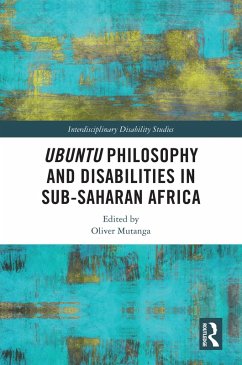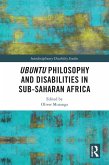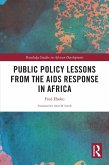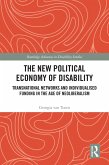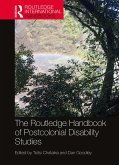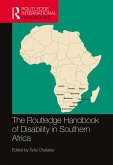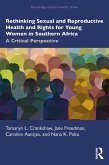Dieser Download kann aus rechtlichen Gründen nur mit Rechnungsadresse in A, B, BG, CY, CZ, D, DK, EW, E, FIN, F, GR, HR, H, IRL, I, LT, L, LR, M, NL, PL, P, R, S, SLO, SK ausgeliefert werden.
Sarah Dauncey
Professor of Chinese Society and Disability at University of Nottingham, United Kingdom
In Ubuntu Philosophy and Disabilities in Sub-Saharan Africa, Oliver Mutanga charts a new and refreshing path that not only deconstructs Western Eurocentric perspectives, paradigms and narratives on Disability Studies, which overlook 'the impact of colonialism and its continuing negative influence on the lives of people with disabilities in the Global South'. Mutanga's book also centres Disabilities Studies in the African philosophy of Ubuntu. He has assembled a broad and diverse team of African scholars from Botswana, Ghana, Lesotho, Nigeria, South Africa, Uganda, and Zimbabwe, who draw on the transformative potential of the philosophy of Ubuntu to interrogate colonialist ableist ideologies, social structures, and disability-related challenges in Sub-Saharan Africa. A lot has been written, on the one hand on the philosophy of Ubuntu, and on the other hand on disability. Mutanga's book weaves Disability Studies and the philosophy of Ubuntu into a rich tapestry that breathes fresh air into our taken-for-granted conceptions the notion of 'disability'. The book is premised on the assumption that the philosophy of Ubuntu philosophy, which is anchored in the values and traditions of numerous sub-Saharan African societies, values and traditions, emphasises communal interdependence, collective problem-solving, kindness, generosity, compassion, benevolence, courtesy, human dignity, caring, and respect and concern for others.
A brief look into some of the contributions brings out the book's thrust. For example, drawing on these sub-Saharan African societies' values and traditions, Chigangaidze, Mafa, Simango and Mudehwe call for political participation of people with disabilities and their inclusivity in the governance of communities. Gore advocates for interventions in disabilities to be foregrounded in Ubuntu's values such as solidarity, caring, participation, compassion, and respect. Lephoto and Adigun boldly confront the stereotyping of people with disabilities in Lesotho and argue a case for the philosophy of Ubuntu, or Botho in Sesotho as a valuable resource for promoting positive attitudes towards students with disabilities, while also instilling the African ethic of care and support. Writing from an Open Distance Learning (ODL) context, Shandu-Phetla, Ngubane and Adigun broach an often overlooked and neglected area of students with disabilities, and the challenges such students face when navigating the virtual space of online learning where often there are no clear guidelines and policies on the effective use of technology-enabled virtual platforms to support students. They urge ODL institutions to strategically integrate the Ubuntu philosophical values of interdependence, respect, care, and sharing into their programs for support of students with disabilities. Marovah and Mutanga situate Disability Studies and Ubuntu within the discourses of Africanisation and decolonisation. They argue a case for Ubuntu as a tool for decolonising Participatory Research (PR) in the global South with a view to addressing power imbalances and challenges inherent in the research process. They call for future research to explore the application of indigenous African philosophies and practices in decolonising participatory research in order to contribute to the diversification and enrichment of knowledge production in the global South. Ubuntu Philosophy and Disabilities in Sub-Saharan Africa is an invaluable, well timed and essential reading for higher education practitioners. It is especially relevant in this era where the world has just emerged from the ravages of the outbreak of the COVID-19 pandemic, and is now bracing itself for major socio-economic and cultural challenges as a result of the war between Russia and Ukraine, which has the potential to evolve into World War III.
Moeketsi Letseka
Professor, Holder of Endowed UNESCO Chair on Open Distance Learning (University of South Africa), Member of South Africa's National Commission for UNESCO
Ubuntu Philosophy and Disabilities in Sub-Saharan Africa employs a variety of methods, including conceptual analysis, qualitative data, participatory research, and applied ethics, to address disability as it features in a variety of African countries and mainly in the context of higher education. It demonstrates how communal values salient in indigenous Africa are a revealing lens through which to appreciate not only ways in which students with disabilities are not given their due, but also which attitudes, technologies, practices, and policies morally must change. Although the contributors believe that context-specific values are vital, readers should not suppose their prescriptions are attractive only for African societies; instead, the world has much to learn from this book about how to bring people closer together when it comes to disability."
Thaddeus Metz
Professor in the Department of Philosophy at the University of Pretoria in South Africa. He is the author of A Relational Moral Theory: African Ethics in and Beyond the Continent

